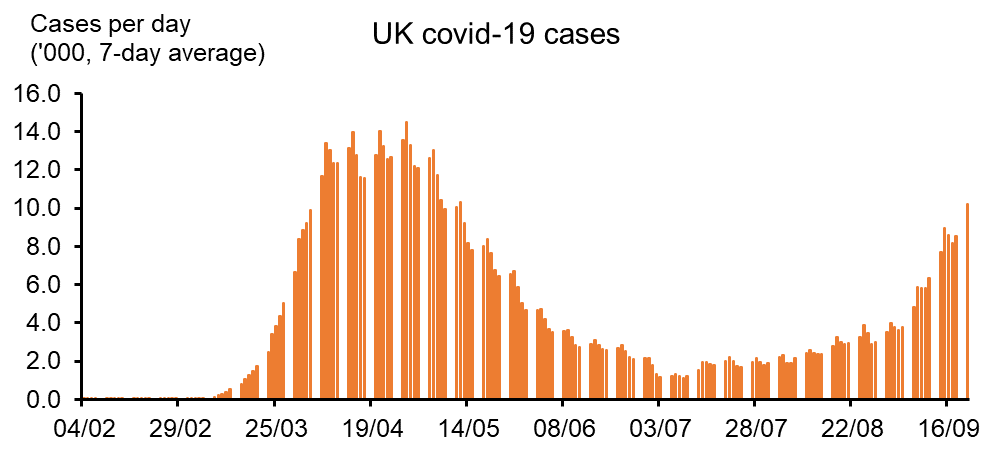Markets Daily: The covid-19 second wave - the UK in perspective

On 22 September 2020, the World Health Organization (WHO) noted that the past week saw the highest number of reported coronavirus cases in a single week since the pandemic began. This comes as global coronavirus cases surpassed 32 million cases and continue to increase in Europe, raising fears of a second wave.
Cases have been surging in Europe, India, the US and Brazil, however, the number of deaths has not picked up significantly, standing at 972 000 globally. The WHO also warned of the alarming rates of transmission of Covid-19 across Europe and cautioned countries against shortening the duration of the quarantine process.
Some countries are considering re-imposing lockdown restrictions as fears of a resurgence intensify. The US has recorded over 7.1 million cases and 204 925 fatalities. In India, coronavirus infections have been increasing at a rapid rate, with 5.6 million confirmed cases, surpassing Brazil with the number of caseloads, and 90 021 deaths. Brazil recorded 4.5 million cases and 137 445 deaths since the beginning of the pandemic, while Russia’s confirmed cases surpassed 1 115 810 cases and 19 000 deaths.
In Africa, coronavirus cases are rising at a relatively slower pace, with 1 425 569 cases and 34 229 deaths recorded. South Africa has almost half of the continent’s cases at 661 936 and 15 992 deaths. Countries close to Europe, like Morocco, have seen an increase in coronavirus infections, with 103 346 cases and 1 889 deaths. Egypt recorded 102 141 cases while Nigeria and Ghana recorded 57 437 and 46 062 cases respectively.
About 170 candidate vaccines are being tracked by the WHO, with just nine in the large efficacy trial phase 3. The AstraZeneca US clinical trial for a Covid-19 vaccine remains on hold pending a safety panel investigation its side effects by the Food and Drug Administration.
The UK second wave of covid-19, the BOE and Brexit
The UK Prime Minister, Boris Johnson, announced new restrictive measures to curb the spread of the coronavirus as fears of a resurgence mount. On Tuesday 21 September 2020, Boris Johnson announced new restrictive measures, including the extension of the use of face masks, to curb the spread of the virus as confirmed daily infections rise sharply. Also, a 22:00 curfew for pubs, restaurants and other hospitality services has been imposed. Office workers are advised to work from home again, where possible. Penalties for not wearing a mask or gathering in groups of more than six will increase to £200 on the first offence.
From Monday 28 September 2020, only 15 people will be able to attend weddings and civil partnerships, in groups of six. Funerals can still take place with up to 30 people. Also, adult indoor sports will be allowed for groups less than six. While the planned return of spectators to sports venues was revoked effective 1 October 2020.
The Bank of England (BOE) warned that the recent rise in Covid-19 cases reinforced the downside risks facing the UK economy, but ruled out negative interest rates in the near future. On 17 September 2020, the BOE kept rates unchanged at 0.1% and the size of its bond-buying programme at £745 billion.
The UK published a bill to rewrite parts of the Brexit withdrawal agreement signed in January 2020. The bill proposes no new checks on goods moving from Northern Ireland to the UK. Boris Johnson indicated that the rewriting of the withdrawal agreement is essential to maintain the UK’s economic and political integrity. However, Germany warned that Britain’s plans to override the deal it made with the EU in December 2019 jeopardises the chance of the post-Brexit trade deal, warning that time is running out.
Best regards
Isaah
